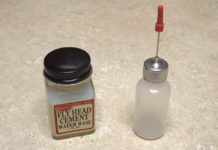While author David James Duncan visits to speak at the Sun Valley Museum of Art (SVMoA), he plans on fishing.
“It’s just incredibly nourishing to be surrounded by that much beauty,” Duncan said. “I’m really looking forward to a little extra time to explore and annoy a trout.”
He loves fishing most after a public appearance.
“I remember every stupid thing I said and nothing that made anybody happy. I guilt trip myself if I just try to go back home and just go to work,” Duncan said. “It takes me back to what I felt like when I was 8 years old and first walked down a stream with a fly rod in my hand. I still feel that idiot joy of a boy.”
On Wednesday, Aug. 31, at 6 p.m., Duncan will speak in Ketchum’s Forest Service Park about how dams negatively impact fish populations on the Snake River. Tickets run $7-$25.
“I feel a pretty heavy responsibility to be entertaining, first of all,” Duncan said. “Just to tell the dark story doesn’t satisfy me. I’ll be trying to turn some unexpected corners … It helps open hearts when we grieve together, and it helps open hearts when we laugh together. I like to turn on a dime sometimes between grief and laughter. I just find the combination works very well in a live crowd.”
Kristine Poole is the artistic director at SVMoA.
“Duncan’s book ‘The River Why’ is beloved by fisherman, recreationalists and all those who appreciate the American West,” Poole said. “His prose has given voice to why our lands need to be valued and protected.”
Growing up, he was taught the sentiment, “the kingdom of heaven is within you.”
“The first time that made any sense to me was walking up a stream with a fly rod in my hand,” Duncan said.
Although holy texts influence his works, Duncan has a complicated relationship with religion.
“My mother and grandmother were pretty devout and not my favorite kind of evangelical,” Duncan said. “There was a lot of Bible shoved at me as a kid, forced to go to church.”
Still, he’s always found Jesus fascinating.
“He was a fisherman after all,” Duncan said.
At the age of 13, he lost his older brother. They shared a birthday.
“He was my hero. He was my protector. And he was gone,” Duncan said.
In his teens, he found solace in serious literature.
“I found books in which grief was powerful and sometimes even beautiful,” Duncan said. “It was spirituality and imagination, not religious doctrine of any kind, that was making sense of things to me.”
While he was still in high school, a friend at Stanford sent Duncan a letter with one line that has stuck with him over the years: “I refuse to kiss the rancid ass of despair.”
“I just don’t want to write dismally dark dystopian stuff that would make a young person feel like there’s no hope,” Duncan said. “It just feels wrong to me to do that. So, I don’t.”
Around 18, he got into Buddhism, going to Trappist Monasteries in Oregon. He would go on contemplative walks on the acres, admiring the Cascade peaks.
“That’s what I do on a trout stream, too,” Duncan said.
He worked nights as a janitor to put himself through Portland State.
“You’d have to have a night job as a divorce attorney now to put yourself through college,” Duncan said.
At the time, MFA programs were relatively new.
“I felt I needed to study literature more,” Duncan said. “I already knew I wanted to try to become a writer.”
For years, he worked as a bartender, a trucker and a deliveryman.
“That felt like that was my grad school,” Duncan said.
His first attempt at a novel in his mid-20s was a grim, self-serious diatribe dismantling the decadence of Christmas. He had watched as the Vietnam War claimed the lives of his classmates.
“I wanted to write a book that was dark,” Duncan said.
Working on it for a year and a half, he had only about a hundred pages. He kept getting distracted by a fisherman character.
“It was ruining that novel because the chapters about fishing were really funny,” Duncan said.
To get it out of his system, he followed that character down 300 pages.
“The big discovery for me was learning that a sense of humor can be used with a serious purpose,” Duncan said.
That became the first draft for his novel “The River Why.”
“That’s my favorite thing to write, but it also turns me into a perfectionist,” Duncan said.
The manuscript for that Christmas novel is now in a landfill outside Portland.
“My first drafts are like demented letters to myself, but I have a lot of patience. By the time I’ve walked through the story, five to 15 times, it gets a lot better,” Duncan said. “It’s a form of self-effacement where the art itself becomes what’s real. The characters are alive in my imagination so it’s extremely absorbing.”
Knowing that John Updike acted as his own agent, Duncan decided to represent himself. “I didn’t know if I could find an agent anyway,” Duncan said.
Sending unsolicited manuscripts to all the major publishers, he collected over 20 rejections. He later found out why one Boston publisher turned it down.
“He takes fly fishing very seriously, and I made fun of elitist fly fishers,” Duncan said. They laugh about it now.
Eventually, his fishing partner’s wife, poet Sandra McPherson, told him Sierra Club books had started publishing fiction. They hadn’t. But they changed their policy after reading the first three chapters of the “The River Why.”
He went onto great acclaim, winning the Western States Book Award, three Pacific Northwest Booksellers Awards, the American Library Association’s 2004 Award for the Preservation of Intellectual Freedom (alongside Wendell), a National Book Award nomination and an honorary doctorate from the University of Portland.
“There are pleasures around it, but also horrors,” Duncan said. “Being put on a pedestal by somebody who doesn’t know me but responds strongly to my work just makes me want to just kick the pedestal out from under myself as fast as possible so it can just be a normal human relationship with whoever the ‘admirer’ might be … I’m sure there’s plenty of people who despise my work, too, but I don’t hear much from them.”
His success has led to a fruitful career of conservationism.
“I can write nonfiction and do activist work with a much greater head of steam,” Duncan said. “It’s usually something I’m bursting to get off my chest.”
In his book “My Story is Told By Water,” he has an essay titled “Beauty/Violence/Grief/Frenzy/Love.”
“Something beautiful causes me to fall in love with it. I go into a frenzy seeing it destroyed,” Duncan said. “Every once in awhile I’m able to make a difference.”
He became impassioned when Reagan appointed the head of a timber company to lead of the U.S. Forest Service.
“So many things had already been lost or were threatened,” Duncan said.
He helped prevent a cyanide gold mine on the Blackfoot River, made famous by Norman MacLean’s “A River Runs Through It.”
“A bunch of people got stirred up. We were incredibly lucky,” Duncan said.
For once, they overcame the Mining Law of 1872, “One of the most ridiculous laws on the books allowing corporations from anywhere to tear our wild places apart … The people pulled together and we ran those bastards out of here,” Duncan laughed.
On a smaller scale, he picks up beer bottles and forgotten tarps on the side of rivers.
On the Oregon coast streams, when the water drops in June, a lot of steelhead and salmon get stuck in side channels. He comes with a 8-gallon bucket and net, restoring hundreds of fish back to their streams.
“Things like that are a thrill. It’s nice to keep something alive,” Duncan said.
In 2023, he will release “Sun House,” a novel he worked on for 16 years. He considers it his magnum opus.
“It was as much work as all my other books put together,” Duncan said. “It’s kind of hard to say what it’s about because it’s about everything.”
It interweaves seven novellas, following impoverished cowboys and refugees from the city converging on a cattle ranch in Montana.
“I’m really trying to portray something that might give something hope,” Duncan said. “When I shatter a heart, I try as best as I can to at least partially mend it as well.” 
Credit: Source link






























